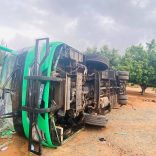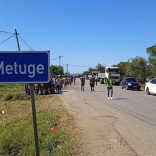South Africa, Mozambique authorities discuss cross-border trade and security - Watch
“Madgermanes”: Leaving a career behind you

Photo: DW
When António Maússe left former East Germany and returned to Mozambique, he wanted to continue working in the meat processing industry, but ended up as a taxi driver instead.
“My dream was to practice the same profession as in Germany,” said António Maússe, 51, a taxi driver and former worker in the former German Democratic Republic, the GDR. But the dream never came true. António worked in Germany for almost four years as a meat processor in the canning industry under the agreement between Mozambique and the GDR that took thousands of Mozambicans to the former East Germany. When he returned to his country of origin, he got a job as a taxi driver.
“My wish was to see my young children through their studies, finish my house, buy a taxi to have something of my own and some ‘status’ in society and enjoy a decent life like others,” he explains.

But life was never again like the one he had when living in Germany and, today, he earns the equivalent of only 43 Euros a month.
“Life is difficult. Being a taxi driver is not a guaranteed job, you’re driving a cab today and tomorrow the car can break. It’s not easy. The taxi isn’t mine, I’m working doing odd jobs and I do not have any funds for that.”
From industry to the road
Maússe would like things to change in Mozambique. The route that he plies in the suburbs does not make much profit, because people prefer to catch the ‘Chapa’ minibuses.
“I do Xikheleni-Albasine, but I used to do Khawena. In 1991, when I came back, I depended on people who called me to take them to their destinations,” he recalls.
When he returned to Mozambique, he was unemployed and took his driving license, finding a job as a taxi driver.
“But my dream was to practice the profession I learned in Germany. This is not how it happened, not even the promises of money we had in Germany,” he recalls. With his earnings from taxi-driving, he has been trying to build a house of his own since 1991, but is unable to finish the works. “Construction is stuck half-way,” he admits.
Since returning from Germany, he can only survive with the help of his daughters and his wife who “do business in South Africa, sell vegetables, like many ladies do.”
In Germany, he left a family with whom he communicates and hopes to see again one day: “I have a daughter and two grandchildren, one is six and the other four years old. I’m in touch with my family there – we speak all the time.”












Leave a Reply
Be the First to Comment!
You must be logged in to post a comment.
You must be logged in to post a comment.